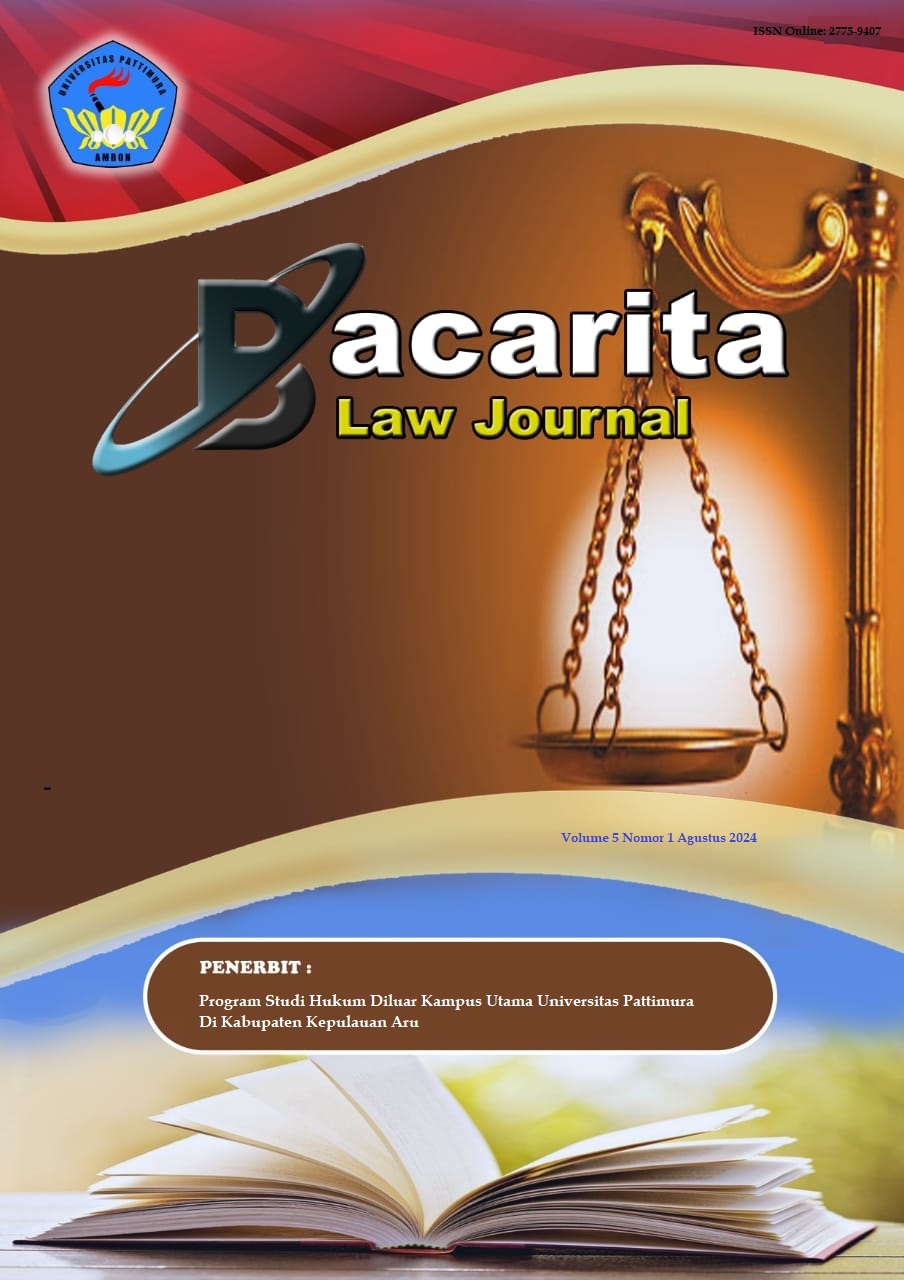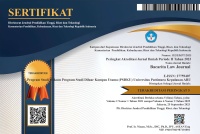Doxing Actions in Personal Data Protection
Abstract
With the rapid development of information technology, various types of cybercrimes have emerged, one of which is doxing. Doxing refers to the act of collecting and disseminating someone’s personal information without consent, with the intent to harm, embarrass, or intimidate the victim. This research aims to analyze the effectiveness of the PDP Law in addressing doxing in Indonesia. While the law Number 27 of 2022 on Personal Data Protection (PDP Law) can be applied to prosecute doxing perpetrators, Indonesia currently lacks explicit legislation specifically regulating this act. This study uses a normative juridical method with a statutory and case study approach. The results show that, compared to the previous Electronic Information and Transactions Law (ITE Law), the PDP Law provides stronger legal protection against doxing. Articles 65 and 67 of the PDP Law impose criminal sanctions for those who intentionally access, collect, or distribute personal data without legal authority. For example, the case of Febriansyah Puji Handoko in 2020 illustrates that if the case had occurred after the enactment of the PDP Law. Therefore, the PDP Law is considered relatively effective in providing legal protection for doxing victims. However, its implementation still faces challenges, such as the suboptimal function of the data protection authority and low levels of digital literacy in society.
Downloads
References
Andrian, Kiki. “Penegakan Hukum Terhadap Pelaku Tindak Pidana Pengancaman Dengan Kekerasan Melalui Media Sosial.” Jurnal Justisia : Jurnal Ilmu Hukum, Perundang-Undangan Dan Pranata Sosial 7, no. 1 (2022): 268. https://doi.org/10.22373/justisia.v7i1.13220.
Armnado, Muhammad Arvy Chico, and Hari Soeskandi. “Pertanggungjawaban Pidana Bagi Para Pelaku Doxing Menurut UU ITE Dan UU PDP.” Bureaucracy Journal: Indonesia Journal of Law and Social-Political Governance 3, no. 1 (2023): 559–68. https://doi.org/10.53363/bureau.v3i1.201.
Dade, Leonardo Latsiano, Caecilia J.J Waha, and Nurhikmah Nachrawy. “Kajian Yuridis Tentang Tindak Pidana Penyebaran Data Pribadi Melalui Internet (Doxing) Di Indonesia” 13, no. 3 (2024): 9. https://ejournal.unsrat.ac.id/v3/index.php/lexprivatum/article/view/54687.
“Definisi Doxing Menurut Cambridge Dictionary,” n.d. https://dictionary.cambridge.org/dictionary/english/doxing.
Gergely, Stefan. “Jumlah Pengguna Internet Indonesia Tembus 221 Juta Orang.” APJII (Asosiasi Penyelenggara Jasa Internet Indonesia), 2024. https://apjii.or.id/berita/d/apjii-jumlah-pengguna-internet-indonesia-tembus-221-juta-orang.
Ki, Max. Undang-Undang Dasar 1945 ( UUD 1945 ), 1945 Undang -Undang Dasar 1945 § (2023). https://peraturan.bpk.go.id/Details/101646/uud-no--.
Liputan6.com. “Pernyataan Liputan6.Com Soal Doxing Jurnalis Cakrayuri Nuralam.” Liputan6.com, 2020. https://www.liputan6.com/news/read/4354423/pernyataan-liputan6com-soal-doxing-jurnalis-cakrayuri-nuralam.
M., David, and Douglas. “Doxing: A Conceptual Analysis,” n.d.
Majelis Umum PBB. Deklarasi Universal Hak-Hak Asasi Manusia, Indonesian Journal of International Law § (2006). https://www.komnasham.go.id/files/1475231326-deklarasi-universal-hak-asasi--$R48R63.pdf.
Manurung, M Yusuf. “SAFEnet Minta Polri Tak Cuma Urus Kasus Doxing Denny Siregar.” 13 Juli 2020, n.d. https://www.tempo.co/hukum/safenet-minta-polri-tak-cuma-urus-kasus-doxing-denny-siregar-602258.
Marzuki, Peter Mahmud. Penelitian Hukum: Edisi Revisi. Revisi. Prenada Media, 2017.
Online, tim hukum. “Apa Itu Doxing Dan Bagaimana Jerat Hukumnya?” Hukum Online.Com, 2023. https://www.hukumonline.com/berita/a/jerat-hukum-pelaku-doxing-lt624d35e6c4f7a/.
Saragih, Aulia Sabrini. “Apa Itu Doxing: Waspadai Metode Hingga Tujuan-Tujuannya.” 15 Oktober, 2024. https://www.tempo.co/digital/apa-itu-doxing-waspadai-metode-hingga-tujuan-tujuannya-102879.
Satria, Muhammad Kamarulzaman, and Hudi Yusuf. “Analisis Yuridis Tindakan Kriminal Doxing Ditinjau Berdasarkan Undang Nomor 27 Tahun 2022 Tentang Perlindungan Data Pribadi.” JICN: Jurnal Intelek Dan Cendikiawan Nusantara 1, no. 2 (2024): 2442–56. https://jicnusantara.com/index.php/jicn.
Syailendra, Moody Rizqi, Sarah Angelina, Setiahata Lumban, Keiko Patricia Liwe, Hanivah Fitriyani, Sarah Angelina, and Setiahata Lumban. “Kasus Doxing Di Indonesia Dalam Perspektif Hukum Dan Etika Corresponding Author :” 4, no. 4 (2024): 32–45.
Willard, Nancy E. “Cyberbullying and Cyberthreats: Responding to the Challenge of Online Social Aggression, Threats, and Distress.” Cyberbullying and Cyberthreats: Responding to the Challenge of Online Social Aggression, Threats, and Distress, 2007, 311–v, 311. http://www.lib.udel.edu/cgi-bin/getit.cgi?url_ver=Z39.88-2004&rft.atitle=Cyberbullying+and+cyberthreats:+Responding+to+the+challenge+of+online+social+aggression,+threats,+and+distress.&rft.au=Willard,+Nancy+E.&rft.date=2007&rft.genre=article&rft.i.
Copyright (c) 2025 Arsha Chaizahra Putri Salsabila, Demas Brian Wicaksono, Irwan Kurniawan Seotijono

This work is licensed under a Creative Commons Attribution-NonCommercial 4.0 International License.
Authors who publish their manuscripts in this Journal agree to the following conditions:
- The copyright in each article belongs to the author, as well as the right to patent.
- Authors are able to enter into separate, additional contractual arrangements for the non-exclusive distribution of the journal's published version of the work (e.g., post it to an institutional repository or publish it in a book), with an acknowledgment of its initial publication in this journal.
- Authors are permitted and encouraged to post their work online (e.g., in institutional repositories or on their website) prior to and during the submission process, as it can lead to productive exchanges, as well as earlier and greater citation of published work.
- Authors have the right to self-archiving of the article (Author Self-Archiving Policy)















